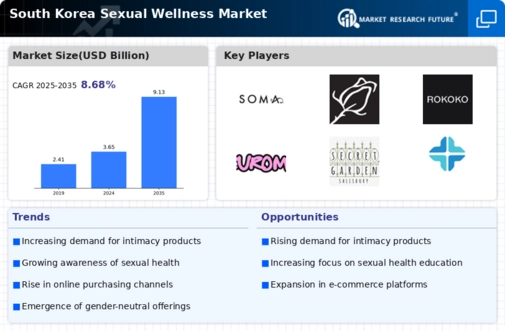The sexual wellness market in South Korea is characterized by a dynamic competitive landscape, driven by evolving consumer preferences and increasing awareness of sexual health. Key players such as Reckitt Benckiser (GB), Church & Dwight (US), and Lelo (SE) are strategically positioned to capitalize on these trends. Reckitt Benckiser (GB) focuses on innovation and product diversification, particularly in the realm of personal lubricants and contraceptives, while Church & Dwight (US) emphasizes brand loyalty through effective marketing strategies and a robust distribution network. Lelo (SE), known for its premium products, leverages digital transformation to enhance customer engagement and expand its online presence. Collectively, these strategies contribute to a competitive environment that is increasingly focused on quality, brand reputation, and consumer education.
In terms of business tactics, companies are increasingly localizing manufacturing to reduce costs and improve supply chain efficiency. The market structure appears moderately fragmented, with several players vying for market share. However, the influence of major companies is significant, as they set trends and standards that smaller firms often follow. This competitive structure fosters innovation and encourages new entrants to explore niche segments within the market.
In October 2025, Reckitt Benckiser (GB) announced a partnership with a leading South Korean e-commerce platform to enhance the distribution of its sexual wellness products. This strategic move is likely to bolster its market presence and improve accessibility for consumers, aligning with the growing trend of online shopping in the region. By leveraging the e-commerce platform's extensive reach, Reckitt Benckiser (GB) aims to tap into a broader customer base, thereby increasing sales and brand visibility.
In September 2025, Church & Dwight (US) launched a new line of eco-friendly condoms, responding to the rising consumer demand for sustainable products. This initiative not only positions the company as a leader in sustainability but also caters to environmentally conscious consumers. The introduction of these products may enhance brand loyalty and attract a new demographic that prioritizes eco-friendliness in their purchasing decisions.
In August 2025, Lelo (SE) expanded its product range by introducing a series of technologically advanced intimate devices that integrate AI features. This innovation reflects a growing trend towards the incorporation of technology in sexual wellness products, appealing to tech-savvy consumers. By staying at the forefront of technological advancements, Lelo (SE) reinforces its reputation as a premium brand and differentiates itself from competitors.
As of November 2025, current trends in the sexual wellness market include a strong emphasis on digitalization, sustainability, and the integration of AI technologies. Strategic alliances among companies are increasingly shaping the competitive landscape, fostering innovation and collaboration. Looking ahead, it appears that competitive differentiation will evolve, with a shift from price-based competition to a focus on innovation, technology, and supply chain reliability. Companies that prioritize these aspects are likely to gain a competitive edge in an ever-evolving market.




















Leave a Comment